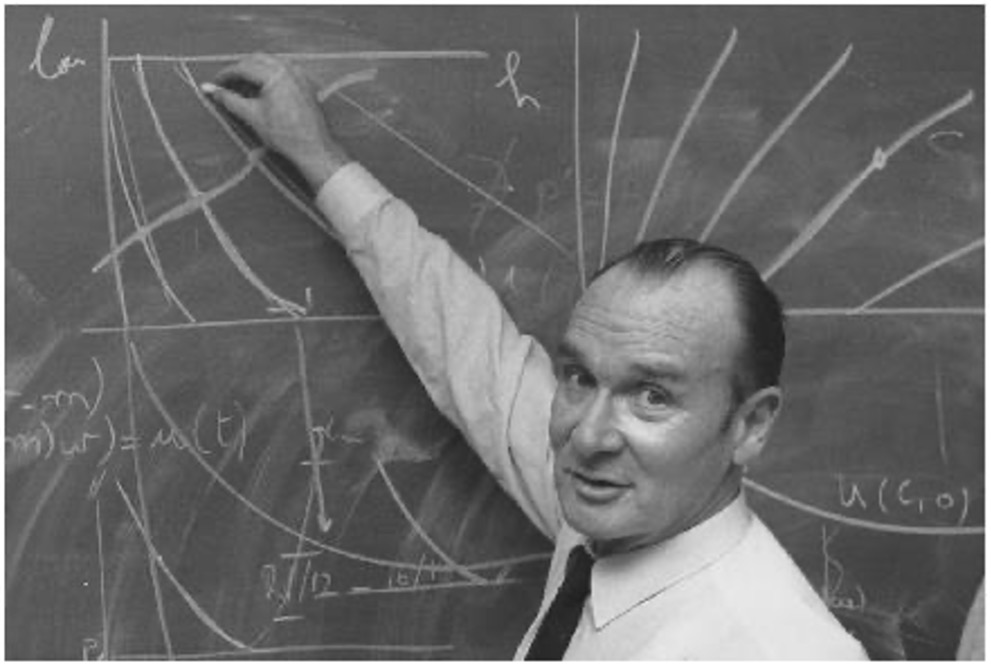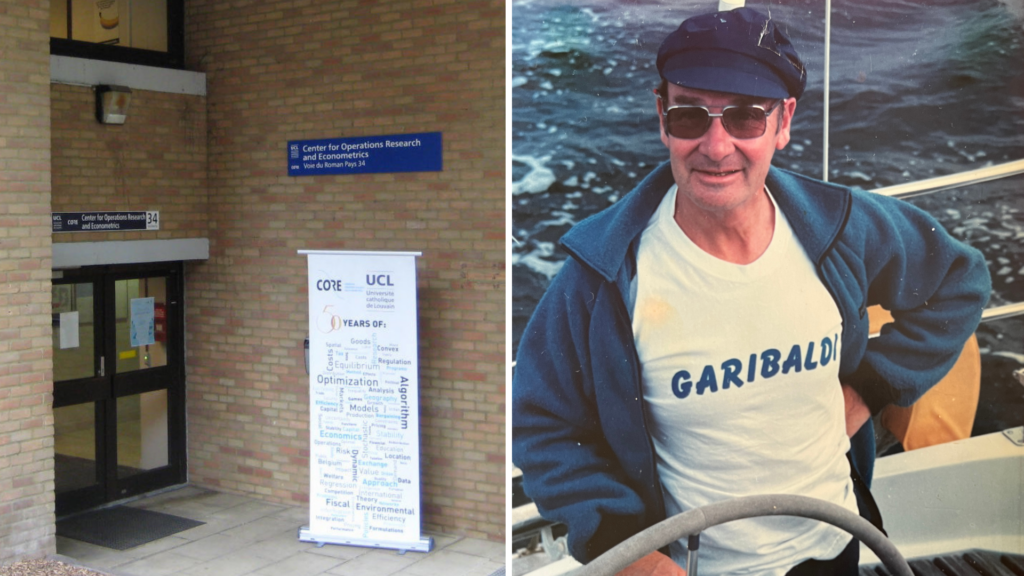Jacques Drèze metamorphosed the discipline of economics on the European continent. He was awarded 19 honorary doctorates from all over the world, the last one by Hebrew University. He was incarcerated because of his participation in a march for peace in the Middle East. Belgium’s Royal Academy, of which he was a member, is about to honour the memory of this exceptional personality.
Philosopher Philippe Van Parijs reflects on current debates in Brussels, Belgium and Europe.
Jacques Drèze was a much-admired teacher, a world-class researcher, an unrivalled academic entrepreneur and a great socially committed intellectual. He was universally regarded as Belgium’s greatest economist.
He was born in Verviers on 5 August 1929, the son of a local banker who mainly served Verviers’s textile industry. After his secondary education, he enrolled at the University of Louvain to study philosophy, not economics. However, following the accidental death of his elder brother, he decided to stay in Verviers to help his father and joined the nearby University of Liège, where he obtained a degree in economics in 1951.
Thanks to a scholarship from the Belgian American Educational Foundation, he went on to study at Columbia University in New York. After shorter stays at several other economics departments in the US, military service at Belgium’s army headquarters, and an assistant professorship at Carnegie University (Pittsburgh), he obtained a doctorate in economics from Columbia University in 1958, with future Nobel laureate William Vickrey as his supervisor.
He was then appointed lecturer and soon after full professor at Louvain’s department of economics while holding successively several visiting professorships in the US. In 1989, at the age of 60, he took early retirement to sail around the world with his wife, joined at one time or another by each of their five sons. After his return from this year-long journey, he remained a very active professor emeritus for three decades. He died on 25 September 2022, aged 93.
A world-class researcher
Drèze was an exceptional teacher, whose generosity and didactic skills benefited not only generations of young Louvain economists but also the adult students of the Economic and Social Policy programme jointly organized by the Christian Workers' Movement and the University. He was also an exceptional researcher, who tackled an extremely wide range of topics in econometrics, economic theory and economic policy. Much of his research took the form of publications with some fifty co-authors of all ages and nationalities, Nobel laureates as well as doctoral students.
Several of his main contributions were motivated by his dissatisfaction with the standard dichotomy between so-called "neo-classical" microeconomics, which aims to understand the economy as a complex interaction between rational agents, and so-called "Keynesian" macroeconomics, which aims to understand the economy as an interaction between aggregates such as GDP, the unemployment rate or the price level. He set about integrating the two within the framework of an ambitious theory of general equilibrium that gave a central place to uncertainty and was thereby better equipped to understand and shape the functioning of today’s capitalist economies.
Record number of honorary degrees
His intense research activity earned him numerous scientific distinctions. In particular, he was awarded nineteen honorary doctorates – more than any Belgian Nobel laureate. The last one – from Hebrew University – he accepted only after some hesitation.
His positions on the Palestinian question had led to his incarceration by the Israeli authorities in 1992 when taking part in a “Walk for a Peaceful Future in the Middle East” co-organised by his son Jean (a naturalized Indian and one of India’s most influential economists). But the economics department – whose most eminent member was the ultra-Zionist Robert Aumann, a long-standing friend of Jacques Drèze and one of his co-authors – was well aware of the political convictions of its honorary doctor, who did not fail to mention them in his acceptance speech.
Drèze was often mentioned among the most likely candidates for the Nobel Prize in economics. Unlike several of his close friends, he never got it. This can no doubt be attributed in part to the extreme diversity of his contributions. Although the economics literature now speaks of "Drèze priors" in econometrics, of a "Drèze criterium" and a "Drèze equilibrium" in economic theory, his scientific work is less easily associated with a single major breakthrough than is the case for other top economists.

Drèze in the lecture theatre.
Unequalled academic entrepreneur
There is, however, another reason for Drèze's lack of recognition from the Nobel Committee. As he put it himself in 2005 in an interview, his contribution to economics consisted mainly in encouraging, promoting and facilitating the research of others rather than in his own personal research. And indeed, no one has played a more decisive role in the development of mathematical economics in Europe.
When he returned to Belgium in 1958, he decided to set up an interdisciplinary and international research centre in the (still bilingual) University of Louvain, bringing together economists, mathematicians and engineers. Thanks to his North American contacts, he succeeded in obtaining substantial funding from the Ford Foundation.
This was to be the Centre for Operations Research and Econometrics (CORE), which Drèze founded in 1966, directed until 1971, chaired until 1983 and continued to support through his active presence and numerous contacts right up to his very last years.
Inspired by CORE, similar centres were subsequently set up elsewhere in Europe, often by former members or visitors of CORE. This effectively put an end to the total supremacy of Anglo-American institutions in a discipline that many – whether rightly or wrongly – consider to be the queen of the human sciences: mathematical economics.
Following on from the creation of CORE and in the same spirit, Jacques Drèze was responsible for another pioneering initiative: the creation, in the early 1970s, of an MSc degree in economics – the very first Belgian university programme in English alongside the degrees in philosophy and theology created in Leuven around the same time.
A few years later, he was behind the creation, in 1979, of the European Doctoral Programme in Quantitative Economics, and, in 1985, of the European Economic Association, of which he was the first President.
A socially committed intellectual
In addition to being an admired teacher and researcher and an unrivalled academic entrepreneur, Drèze was also a socially committed intellectual. His work as a researcher, teacher and academic entrepreneur was largely motivated by the conviction that better data analysis tools and more relevant and rigorous economic theory could help make our societies less unjust.
With Edouard Malinvaud, professor at the Collège de France, he coordinated a European initiative that advocated fighting unemployment through a policy combining public investment, low interest rates, wage moderation, the scrapping of social security contributions on low wages and EU-level taxation of CO2 and capital income.
Deeply affected by the linguistic conflict that put an end to the CORE experiment as a bi-community entity operating in Leuven in English, Drèze also took a constant interest in the economic dimension of the relationship between the components of federal Belgium. Witness, for example, an astonishing essay he published in 1993 on the conditions to be met by a region wishing to secede from a Member State of the European Union if financial solidarity was to be preserved and economic opportunism avoided. Opinion pieces and TV talk shows were not his cup of tea. While not very visible to the general public, his impact – in-depth and long-term – on the Belgian and European public debate is nonetheless very real.
Related News
- Why English is so easy for Francophones to learn
- Vive la Belgique? Leve België? Why there is plenty to celebrate after all
- Europeans and their languages: Is multilingualism dying in the EU?
Drèze never hid the fact that his social commitment was also a Christian commitment, however appalled he was by some aspects of institutional Christianity. In his younger days, he was national leader of the JEC (Christian Student Youth). His participation in a teaching programme co-organised by the Christian Workers Movement also bears witness to this, as does his contribution, in the 1990s, to the activities of the Pontifical Academy of Social Sciences.
Jacques Drèze's funeral was held in the church of Louvain-la-Neuve. The bier was empty, as the deceased had expressed the wish to donate his body to science. Also in accordance with his wishes, the ceremony was not presided over by a priest. Instead, it was presided over by one of his former female students, now pro-rector of the University. For Drèze, the subordinate status to which the Catholic Church condemns women was an intolerable form of discrimination which he could not endorse.
As soon as he arrived in Leuven in 1958, with his doctorate in his pocket, Jacques Drèze entered into a mild rebellion against a dusty economic science and an inward-looking university. It was also with an act of gentle rebellion that he left Louvain-la-Neuve, armed with nineteen more doctorates, 64 years later.
Note: This is an abridged version of the eulogy to be delivered at the Classe des Lettres et des Sciences morales et politiques of the Académie royale de Belgique on 7 October 2024.

